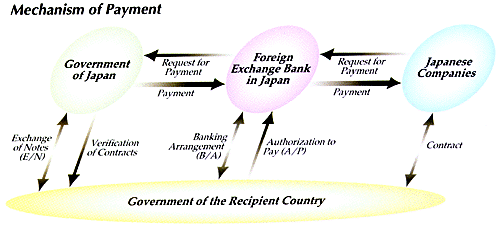

 Japan's
grant aid supports self-help in the recipient country; running
costs and maintenance costs must be borne by the recipient
country
Japan's
grant aid supports self-help in the recipient country; running
costs and maintenance costs must be borne by the recipient
country
Japan's grant aid has been conducted based on a philosophy of
encouraging self-reliance in the recipient country. Cooperation
is provided for the construction of facilities or purchase of
materials and equipment but not for running and maintenance
expenses, consumable supplies and personnel costs, and other
expenditures that are to be made after the completion of the
project. These are the responsibility of the recipient country
and do not fall within the scope of the grant aid.
 Emphasis on basic human needs
Emphasis on basic human needs
Japan's grant aid is provided primarily for projects that
directly benefit the public, such as those aimed at improving the
supply of safe drinking wat er, primary health and medical care,
and primary education. Grant aid is not provided for projects
that might be used for military purposes.
 Official request initiates process
Official request initiates process
The screening process for Japan's grant aid begins when the
foreign ministry or responsible authority in the government of
the recipient country submits an official request to the Japanese
embassy assigned to the recipient country.
 Projects must be completed within a set time period
Projects must be completed within a set time period
Aid commitments are made in the form of an exchange of notes
signed by representatives of the Japanese and recipient country.
Projects must be completed within the same Japanese fiscal year
in which the Japanese cabinet approved the project (see Flow Chart of the Grant Aid Process) or,
when unavoidable, the next fiscal year at the latest.
 The project's consultants and contractors must be
Japanese nationals
The project's consultants and contractors must be
Japanese nationals
Only Japanese nationals (physical and juridical) are eligible to
be awarded the contract for the grant aid projects. The main
contractor, a Japanese national, may use local or third country
nationals as subcontractors. The main contractor is free to
choose any subcontractor of any nationality. However, the
contractors for Non-Project Grant Aid, Grant Aid for Disaster
Relief, and Grant Assistance for Grassroots Projects are open to
non-Japanese nationals.
 Products and services may be procured from third
countries
Products and services may be procured from third
countries
The goods and services purchased under Japanese grant aid should
in principle come from either Japan or the recipient country but
if the two governments deem it necessary, can be procured from a
third country.
 Grant aid is used to hold down debt of the
recipient country
Grant aid is used to hold down debt of the
recipient country
Grant aid is used to pay off the debt that would accrue to the
recipient country in executing the project. For this reason, the
recipient country does not receive the grant aid in cash; the
funds are paid to the Japanese contractor through an account in a
foreign exchange bank of Japan opened by the recipient country.

Back to Index